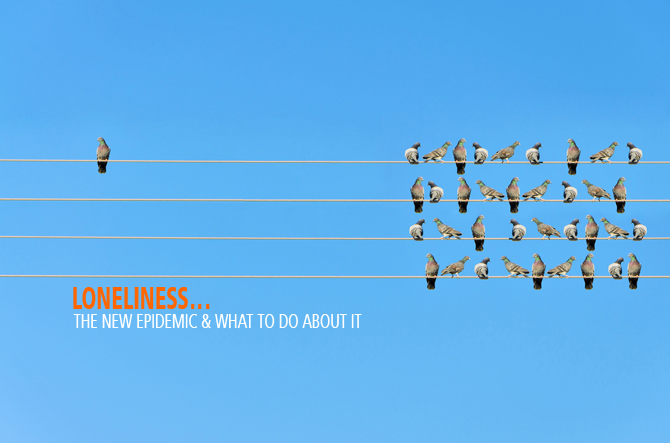Loneliness...The New Epidemic – How It Affects You

You’re living right smack dab in the middle of a health care revolution and here’s why. The United States’ Surgeon General is a medical professional who has been selected to not only assist in providing advice to the Secretary of Health and Human Services, but also to lead 6,500 public health professionals, who are critical in responding to health care emergencies in the United States. It’s an important position.
“In order for the U.S. population to reach its full health potential, behavioral health and addiction treatment providers need to go on the offensive,” the recent U.S. Surgeon General, Vivek Murthy, MD, MBA, told attendees at the 2017 National Council for Behavioral Health Conference (NatCon).
If we solely look at problems through the lens of treatment, we won’t get where we need to go, Murthy said.
Early in his term as Surgeon General, Murthy engaged in a listening tour in communities across the country. He said the stories he heard gave him a better understanding of the toll that mental illness and addictions have taken on families. During a Q & A session at NatCon, Murthy advocated prevention programs, saying they are both cost-effective and currently underutilized.
Murthy also spoke at length on the role communities can play in supporting emotional health in individuals. He noted that in the 1980s, 20% of U.S. adults reported feeling lonely, a statistic that has soared to 40% today. Chronic stress and isolation put individuals at a higher risk for premature mortality, as well as heart disease and dementia. Digging deeper into substance use disorder, Murthy cited chronic stress as an emotional factor that can heighten risk.
To that end, Murthy strongly encouraged NatCon attendees to pursue initiatives that strengthen communities and drive conversations about addressing mental health and substance use disorders, while using science and research to educate the general public and change outdated narratives in the public discourse.

ENLIGHTENING FOR SOME BUT NOT FOR OTHERS
To some this is a new message. To others perhaps, such as those who work in the field of behavioural health, it may not be so much enlightening as it is refreshing to finally hear leaders exhort us to take initiatives toward stronger mental health and community, given their primacy as core drivers in addressing premature degenerative diseases.
But how do we engage deeper with people and forge healthier communities of front-row relationships, when few of us have not had any training or modeling in how to do it? In past blogs, I have discussed the effect relationship fractures and violations can have on our psychology. I have also discussed how poor psychology has a way of trickling down into our physiology and weakening our immune systems, making us more susceptible to premature degenerative disease. Additionally, when we are not feeling good about ourselves, self-care goes out the window. We don’t exercise regularly. We lose work-life balance. We eat poorly.
CHECK IN WITH YOURSELF ON HOW HEALTHY YOUR RELATIONSHIPS ARE
Over the years, our clinical team at the Alive Wellness Centre has been in the pursuit of increasing our competencies and outcomes for helping people restore their mental well-being. Of all the treatment modalities that we use, the most effective has been training our clients about developing strong, engaging, front-row relationships.
Our strategy is to create a “greenhouse environment.” We have found this to be critical for modeling and practicing interpersonal relationship dynamics. The following presents instructions on using the list of the dynamic we focus on:
Print and read through each of the following 20-items, which constitute relationship maturity and engagement levels. Rank yourself from 1-5 (with 5 being the highest). Total your rankings to create a total score out of a potential score of 100. Next, have three people, who know you well, rank you on the same items without seeing your scores. Add the four scores and divide by 4 in order to obtain your score. The higher your score, the more engaged and mature your relationships are.
Tape this page somewhere visible, e.g. the back of your medicine cabinet, to keep it in the top of your mind. Repeat the rankings 3-months and 6-months later, calculating your score in the same manner. You can place your initial score, your 3- month score and your 6-month score side by side on the page. You will be amazed how much you can increase your overall score by simply being more aware and deliberate about wanting to increase your relationship skills and re-measuring your self.
- I am able to create a high trust quotient with the first and second row people in my life.
- I am able to discern another person`s emotional state and extend empathy (rather than judgement).
- I am able to be my true authentic self, instead of my fabricated self when doing relationship with people.
- When compassion is given to me I don’t reject it but instead accept it.
- I can discern when a person needs compassion and I am able to give it to them.
- People perceive me as someone who is microscopically honest.
- I usually accept apologies and forgive others when they hurt me.
- I ask for forgiveness when I hurt others.
- I am able to intuitively discern when a person is in need and serve them.
- I perform random acts of kindness regularly.
- I respect people’s boundaries when they attempt to set them.
- I can set boundaries when required of me.
- I am able to shift into playfulness when others are in the mood.
- I can laugh easily when the opportunity avails itself.
- I am able to keep initiating pursuing a friend even though for whatever reason they have not been proactive in pursuing me.
- People experience me as someone who listens in a way that makes them feel understood.
- I can be spontaneous without being irresponsible.
- I strive to find similar values with people that I know, yet I can also accept values that are different.
- In my relationships, I never lose sight of my friends potential and express it through validating statements that build them up and reinforce this potential, no matter how small or undeveloped it is.
- I accept the fact that I will get hurt by the other person and I am ready to repair any fractures by being committed to humility, forgiveness, and getting the friendship back on track.

